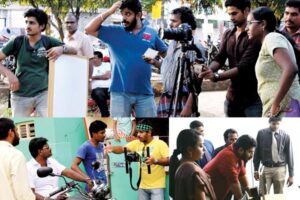Diploma in Film Making (One Year)
One year diploma in filmmaking (Fulltime)
This course will help you to enter the film industry with the necessary professional skills and understanding. It can also help you to become an independent film maker. You will be helped to acquire basic skills in various areas of filmmaking like script writing, cinematography, editing, acting and directing. The course will also expose you to the artistic and aesthetic sides of filmmaking. There will be both theoretical and practical orientation. Responding to popular demand, this programme was launched during the academic year 2016-17.
Duration: One Year (Two Semesters)
Medium of Instruction: The course will be taught bilingually
Eligibility: Pass in +2 or its equivalent
Course Content
| SEMESTER – I | SEMESTER – II |
|---|---|
| Film History and Film Appreciation – I (4hrs/Week) | Film History and Film Appreciation – II (4hrs/Week) |
| Film Acting – I (4hrs/Week) | Film Acting – II (4hrs/Week) |
| Screenplay Writing (4hrs/Week) | Film Editing (4hrs/Week) |
| Photography and Cinematogrphy (4hrs/Week) | Sound and Music (4hrs/Week) |
| Graphics and Animation for Film Making (4hrs/Week) | Film Direction and Production (4hrs/Week) |
Film History & Appreciation I & II
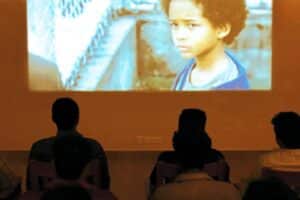
The academy also encourages students to view as many trend setting film as possible after class hours on the large screen. The course is taught in two semesters because of two reasons. First, it involves more than a hundred year history of cinema. Second, it helps you to form the much needed perspective to place every other craft in place- film acting, cinematography, art direction, editing and directing.
Film Acting I & II
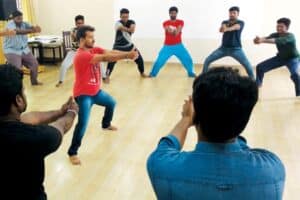
Different approaches to acting, performance techniques involved in acting, aesthetics of acting performances and the distinctiveness of film acting will be taught through highly participatory workshops by industry trained people. Students are also encouraged to prepare their own script for staging performances.
Screenplay Writing
Both the creative as well as execution aspects of filmmaking are anchored in screenplay. MMFSA believes that anyone thinking of a career in filmmaking should have basic skills in screenplay writing irrespective of the fact what he/she wants to choose as later specialization. Screenplay writing is taught at three levels. Our first level workshops are designed to unleash the basic creative energy in each individual. The second level is teaching the basics of screenplay through lectures, illustrations and participatory exercises.
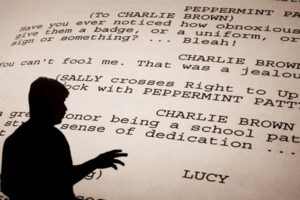
This will include understanding of different narrative strategies, plot structure, characterization, dialogue writing, formatting etc. The final stage is a series of facilitative workshops in which each student develops his or her one-liner, writes treatment and scene outline, develops a full-fledged screenplay and format it. Though the Screenplay Writing is marked for the first semester, workshops and practice exercises will continue during the second semester also.
Photography & Cinematography
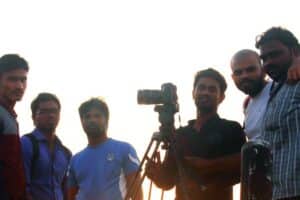
Theory classes will be followed by demonstrations by experts and hands-on training. Students will be asked to produce photographs and video clippings that would employ different narrative strategies with both still and movie cameras.
Computer Science & Animation
This is a laboratory based course. First, it aims to provide basic knowledge to students on how animation is done through traditional drawing and painting, and computer graphics. Second, students are helped to acquire basic knowledge and practical skills for creating posters, image manipulation, retouching and creating 2d and 3D scenes or objects for pre-visualization. Third, it equips students with basic skills for storyboarding. Software to be used are Adobe Photoshop, Adobe Illustrator and Autodesk Maya (Introduction). This will prepare the student for understanding higher level concepts in VFX and Editing that will follow in the second semester.
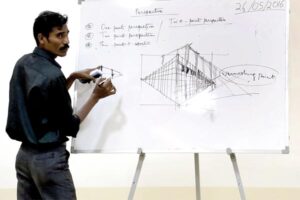
Film Editing and VFX
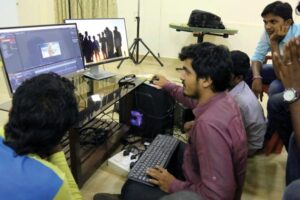
Sound and Music
There is no film narrative without sound and music. The course begins with the sketching of the evolution of sound and music technologies, in films. Students will be taught the fundamentals of sound design in terms human voice (dialogue), music score, special effects and silence. They will be enabled to acquire skills in handling sound recording equipment and practically understand issues in sound recording. Techniques and concepts in sound editing, sound mixing, and sound mastering, and the use of software, will be taught through practicals. Student assignments will be in the form of live recording, dubbing and sound editing for short films and documentaries. The students will be made to understand the place of Carnatic, Hindustani, Western and Folk music in Indian films.
Production and Direction
